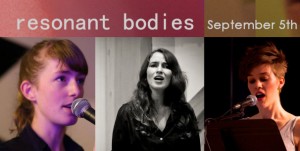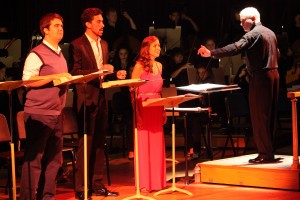Every year’s Proms has several thematic threads, often celebrating anniversaries and birthdays. This year, no exception, had a large number of performances commemorating the centennials of the births of Benjamin Britten and Witold Lutoslawski, and a bunch of them occurred during the slice of the Proms that I was around for. In the concerts in the Albert Hall Britten was represented by Les Illuminations, performed by Ian Bostridge and the London Symphony Orchestra, conducted by Daniel Harding, in their concert on August 20. Les Illuminations sets poems of Rimbaud, a poet whose work was introduced to Britten by W. H. Auden; Britten began it with settings of two poems for Swiss soprano Sophie Wyss, and she sang them at the Queen’s Hall under Henry Wood. Later that year Britten added settings of seven more poems, connected by the refrain “J’ai seul la clef de cette parade sauvage” [I alone have the key to this savage parade.] Wyss was the soloist for the first complete performance in 1940 in London, but by 1941 the work had become the property of Peter Pears, who sang the first American performance with the CBS Symphony Orchestra, conducted by Britten. Ian Bostridge has become a major performer of a lot of the music that Britten wrote for Pears. He delivered a performance on this concert with a good deal of confidence, even swagger, which is appropriate for this piece. This listener has never warmed up to Les Illumination, or, for that matter, to Bostridge as a performer of Britten’s music, and this performance didn’t change anything. The concert began with a brief fanfare, derived from his oratorio The Mask of Time, by Michael Tippett, which was followed by his Concerto for Double String Orchestra, his earliest work. Britten and Tippet were contemporaries and friends; when the first recording of the piece was made, during the Second World War, while Tippett was imprisoned as a conscientious objector, Britten was the co-producer. (more…)
Thursday night kicked off the Resonant Bodies Festival, a new 3-day parade of contemporary vocal music at ShapeShifter Lab in Brooklyn.
Each night features three young singers performing programs of their favorite music. This curatorial freedom gave last night’s show a happy zealousness, where the singers’ enthusiasm for their repertoire was contagious.
Festival curator Lucy Dhegrae marked out a broad territory in her set. Beginning with Jason Eckardt’s mantic Dithyramb, she swiftly established her virtuosity in an elastic, preverbal but hyper-articulate world. In Old Virginny, by Shawn Jaeger, juxtaposed a forthright Appalachian lament with a snarling, snaky bassline, played athletically by Doug Balliett, to surprisingly tender effect. Balliett then took the mic for the premiere of his newest Ovid rap cantata, #11, Clytie and the Sun. While not the most arresting of his cycle (see Echo and Narcissus), it delivered a highly entertaining mix of humor and pathos, and Dhegrae’s theatrical arias, as the smitten Sun, were the perfect foil to his informal Narrator. (more…)
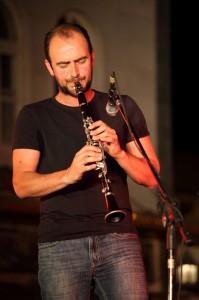
On September 3rd Kinan Azmeh CityBand returned to Joe’s Pub for the official release of their new album, Elastic City. The disc, a collection of passionate and virtuosic pieces in the genre of Arab World Jazz, features Azmeh (clarinet), Kyle Sanna (guitar), Josh Myers (bass), and John Hadfield (drums and percussion). Formed in 2006, the ensemble has received critical acclaim in the US, Europe, and the Middle East. Judging from the large and wildly enthusiastic audience at Joe’s Pub, they are clearly developing a big following here in New York.
Born and raised in Damascus, Azmeh finished his training at New York’s Juilliard School and has since gained international recognition as a clarinettist, composer, and musical innovator. He’s currently recognized as one of Syria’s leading classical musicians and composers, and also has a well deserved reputation as one of New York’s most engaging composer-performers. In addition to his work with CityBand, Azmeh performs regularly with the Syrian ensemble HEWAR, the Damascus Festival Chamber Music Ensemble (of which he is the artistic director), and also as a solo artist.
CityBand has a captivating stage presence and an interpersonal attunement that comes from years of performing together. They respond intuitively to each other, grooving effortlessly in complex meters, and never getting in each other’s way. Their improvisations are sophisticated and emotionally powerful, each member contributing a distinct individual voice to a seamlessly blended whole. At times Azmeh brings the dynamics of the group down to an almost inaudible level, building it slowly to ecstatic heights.
Azmeh started the evening with a deeply moving solo entitled A Sad Morning, Every Morning, a composition that he wrote in memory of the thousands who have lost their lives in the Syrian conflict. Other memorable moments included Woods, a haunting and transportive work by Kyle Sanna, and Wedding, a raucous piece written by Azmeh that featured the group’s dazzling virtuosity.
Kinan Azmeh: A Sad Morning, Every Morning (art by Kevork Mourad)
[youtube]http://www.youtube.com/watch?v=nD9jbBFKetA[/youtube]
It’s September, the beginning of a new season, and time for our annual below half-price one-year Sequenza21 sponsorship/advertising sale. You can change your ad monthly if you like so basically, you get up to 12 ads for the price of 5 at the standard rate.
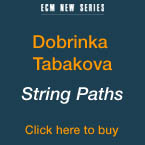 145×145 – $1,000 for 12 months (Standard Rate – $200 per month)
145×145 – $1,000 for 12 months (Standard Rate – $200 per month) 145×400 -$1,500 for 12 months (Standard Rate – $350 per month)
145×400 -$1,500 for 12 months (Standard Rate – $350 per month)
The late night Prom presented by the BBC Scottish Symphony Orchestra conducted by Ilan Volkov on the 19th of August is the kind that is guaranteed to draw an audience whose interest and enthusiasm is in inverse proportion to its size. I think there used to be more of them, but it’s hard to be sure. John White, born in 1936, is a rather legendary figure of one wing of the British avant garde, associated with composers such as Cornelius Cardew, Gavin Bryars, Howard Skepton, Roger Smalley, and Dave Smith, as well as Michael Finnissy. He is best known for his piano sonatas, of which there at least 200. People who know his music are devoted to it, but it rarely gets played. This performance of his Chord-Breaking Machine from 1971 was the first one I’ve encountered. The piece involves short rhythmic patters repeated at different rates in the winds and strings, while the brass sustain the harmonies produced thereby, against conflicting rhythmic patters in the percussion. The process as set up blurs the edges of the boundaries of the movement in time from one harmony and the next. It’s really an early minimalist process piece dating from a time before the genre had been conclusively named. This was a very good example of it, with lots of energy, and it was enjoyable and interesting, although it seemed a bit short. (more…)
On the Proms Chamber Music concert at Cadogan Hall on Monday, August 12, the women of the BBC Singers, along with flute player Philippa Davies and harpists Lucy Wakeford, Helen Tunstall, and Hugh Webb, of the Nash Ensemble conducted by Nicholas Kok, performed the UK premiere of Harrison Birtwistle’s The Moth Requiem. During the short interview before the performance, Birwistle said that as a young man he had had an interest in natural history, and was particularly interested in moths. Moths, he said, have a bad reputation because “they eat your cashmere,” going on to say that of the more than a thousand species of moths, only two eat cashmere. He sees the moths as emblematic of thing which are disappearing, both in the world, and in his life. “A lot of people seem to be going from my life,” he said, “and soon I’ll be going.” He wanted to write a piece which dealt with that, but he didn’t want to write anything morbid or sugary; he wanted it to have some idea of the anger he feels about it all.
Like Ravel in Daphnis and Chloe and Vaughan Williams in Flos Campi, Birtwistle uses the chorus instrumentally. Unlike those other composers, he gives them words to sings, although making it clear from the beginning that the perception of those words is not the point. The text of The Moth Requiem is the Latin names of twelve extinct species of moths, along with a poem by Robin Blaser, who (more…)
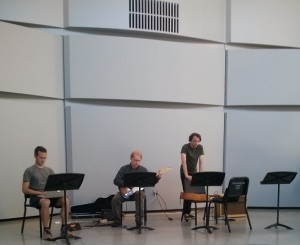 The two-week long series of experimental music concerts in and around Los Angeles concluded Saturday, August 17 with es geht weiter a reading of nine compositions from members and friends of Wandelweiser, an international group of composers and performers founded in 1992. The event was held at the Wild Beast performance space on the Cal Arts campus in Valencia and was curated by faculty and Wandelweiser member Michael Pisaro.
The two-week long series of experimental music concerts in and around Los Angeles concluded Saturday, August 17 with es geht weiter a reading of nine compositions from members and friends of Wandelweiser, an international group of composers and performers founded in 1992. The event was held at the Wild Beast performance space on the Cal Arts campus in Valencia and was curated by faculty and Wandelweiser member Michael Pisaro.
Twelve musicians in various combinations performed the nine pieces and a number of these works were heard in the US for the first time. The instrumentation varied widely – including found objects, standard instruments played normally or by coaxing out new sounds, voices and various electronics. Many of the pieces were very soft with long pauses and this invited a high level of alertness and concentration from the audience.
The nine works offered in this concert were highly varied in their instrumentation and approach – here are some random observations and reactions:
Through the window and the wood – Daniel Brandes. Very soft solitary electronic tone that slowly increases in volume, is then joined by a voice and followed by silence for several minutes. The most subtle of pieces, the long silences and low dynamics are effective in putting the listener in a heightened state of anticipation. (more…)
Mark Anthony Turnage’s Frieze, performed by the National Youth Orchestra of Great Britain, conducted by Vasily Petrenko, on August 11, and Nashit Kahn’s The Gate of the Moon, a concerto for sitar and orchestra, performed by Kahn himself with the BBC National Orchestra of Wales, conducted by David Antherton, on August 12, both raise the question of how one in a new piece can meaningfully reference other music. Turnage’s work was commissioned by the Royal Philharmonic Society to celebrate the organization’s bicentennial and to be on the same program with their most famous and, probably, greatest commission, the Beethoven Ninth Symphony; this shorter work which is clearly modeled on the Beethoven in its general layout, is a sort of gloss in his own language on the older one. Kahn’s Concerto joins an orchestra of western instruments and a single Indian one and aims at joining their indigenous musical languages in a meaningful way as well. (more…)
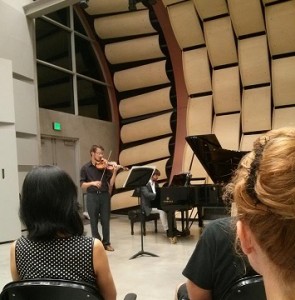 As part of a two-week long concert series of experimental music, For John Cage (1982) by Morton Feldman was heard at The Wild Beast performance space on the campus of California Institute of the Arts in Valencia, CA on August 14. Dante Boon was at the piano and Andrew McIntosh played violin in the concert titled, suitably, ‘Bon Amis‘.
As part of a two-week long concert series of experimental music, For John Cage (1982) by Morton Feldman was heard at The Wild Beast performance space on the campus of California Institute of the Arts in Valencia, CA on August 14. Dante Boon was at the piano and Andrew McIntosh played violin in the concert titled, suitably, ‘Bon Amis‘.
John Cage and Morton Feldman both have historical connections to Cal Arts: Cage received an Honorary Doctorate of Performing Arts from the Institute in 1986, and Morton Feldman was composer-in-residence that same year. The Wild Beast was named in honor of Feldman who, according to the campus website, “likened the ineffable creative energy in art to a wild beast.” The Wild Beast is an airy but not overly large space with good acoustics that were well-suited to this performance.
For John Cage is a quiet piece for piano and violin played at very low dynamic levels, yet all of the nuances could be plainly heard. Typically the piano plays a few notes or a soft chord and the violin answers, followed by a brief pause. The phrases are sometimes repeated, or the violin sounds first or they may play together – but the call-answer pattern predominates. For me the sequence was most effective when the piano made a declarative statement and the violin softly reflected off the slightly harder tones of the keyboard. This seemed to heighten nuances in the violin, especially in the quietest passages.
Dante Boon provided a solid foundation throughout, never tentative with the many piano entrances but always with the delicate touch that this piece requires. His sensitive playing set the stage for the violin and here Andrew McIntosh displayed amazing control of pitch and intonation, even when the sounds coming from his instrument were barely above a whisper.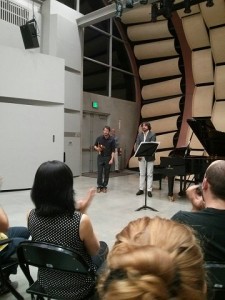
Despite the fragmented nature of the piece – and its 75 minute length – it was never boring. This was due largely to the quality of the playing but also the fact that it was performed live in a space where the finest details were audible. The soft dynamics invite the listener to concentrate on each passage played and to create the context for it. This is challenging listening but those in attendance were engaged throughout – and there were happily no coughing attacks or cell phone outbursts to break the spell. This was an excellent performance of one of the landmarks of late 20th century experimental music.
The concert series concludes with Es geht weiter, music by Jason Brogan, Dante Boon, Taylan Susam, Sam Sfirri, Daniel Brandes, Stefan Thut and Johnny Chang at The Wild Beast, Cal Arts, Valencia, Saturday, August 17 at 5 pm. Admission free.
Tanglewood capped this year’s Festival of Contemporary Music with the U.S. premiere of George Benjamin’s Written on Skin. After an initial brief hiccough (Mr Benjamin forgot his baton when he first came on stage), the orchestra negotiated the technically complex score with no apparent difficulty and, though very large, never overwhelmed the vocalists. This was aided by the light and inventive orchestration; with the exception of a few well-placed monstrous tuttis, most of the time there were only a handful of instruments sounding. The Medieval setting also allowed for occasional light Early Music references: senza vibrato, perfect intervals, and the inclusion of a pair of Mandolins, a Verrophone, and a solo Gamba.
Evan Hughes gave a superlative performance as the Protector, convincingly portraying both domineering patriarch and devastated betrayed husband. Lauren Snouffer was excellent as the Protector’s wife Agnès, particularly during her character’s more dramatic moments, although I found myself occasionally glancing at the title screens to catch the text. Tammy Coil and Augustin Mercante were both superb in their double roles as Angels and as Agnès’ sister and brother-in-law. Isaiah Bell was fine in his double role as the Boy and the third Angel, but again I found myself reading more than I would have liked. All received a well-deserved extended standing ovation.
Staging was minimal – this was a concert performance – but effective; the music alone was quite descriptive, particularly the purely instrumental murder scene (no death aria here!). The front of the stage was divided into three areas: to the left, under yellow lighting, were the Angels; in the center, under red lighting, was the main home; to the right, under blue lighting, were all other locations. The orchestra was so large that the vocalists were forced to pass between the conductor and the orchestra in order to move from the center area to the right. Here’s hoping an American opera company will present a staged version soon – it is certainly deserving.
– Composer Robert E. Thomas teaches at College of St. Rose in Albany, New York.
